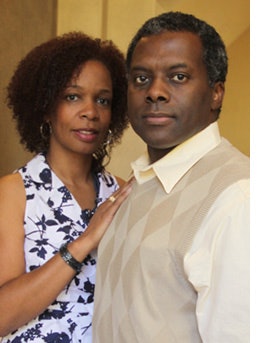 Bradley and Bonita Vinson suggested ways that African-American students can obtain a debt-free graduate education.
Bradley and Bonita Vinson suggested ways that African-American students can obtain a debt-free graduate education.African-Americans bear a disproportionate amount of consumer debt in our nation’s economy. The wealth gap between African-Americans and average Americans continues to widen. One way to close that gap is through higher education.
The pursuit of graduate education increases the likelihood of even greater earning potential; however, more student loan debt can be a barrier to African-American students’ pursuit of graduate enrollment and completion and adversely impact their financial futures.
In a recent presentation to attendees of the American Association of Blacks in Higher Education’s (AABHE) Annual Conference, husband and wife finance gurus Bradley and Bonita Vinson exhorted that financial empowerment is the key to financial success. As the proprietors of Vinson Financial Consulting Services and creators of Your Personal Economy Financial Empowerment Seminars, Bradley and Bonita shared the fallacy of credit, the harmful effects of debt, how to get out of debt, and offered debt-free options to pursue when seeking advanced degrees.
Not only is living debt-free the bottom line of the Vinson’s lecture, it is also the premise. Before the Vinson team offered the debt-free approach to obtaining higher education, they felt it very important to share where African-Americans stand financially as a community and “how we got in here” in the first place.
Research studies reveal startling statistics and information about African-Americans’ economy. Taken from the Vinson’s presentation, let’s look at the statistics:
The Financial Status of African-Americans:
- More than 1 trillion per year in buying power. (Making us the 16th largest country)
- 48% adversely affected by the real estate crisis
- 39% deals with lack of disposable income
- 12% fear debt is unmanageable
- 20% have taken loans from their 401K/retirement accounts to deal with debt
How we got here:
- African-Americans earn only 61% of White Americans’ income
- 54% of African-Americans have no savings
- Less than 50% of African-Americans own a home compared to 70% of Whites
- African-Americans are most frequent users of payday loans
- African-Americans spend double that of Whites on the lottery
Where do we go from here? Firstly, there are practical things we can do to improve our individual financial statuses.
“The first thing I tell people to do is see where you are financially. A lot of people aren’t broke; they just mismanage their money,” Bradley Vinson said. “Pay yourself first. You don’t see wealthy people standing in the lottery lines. You see poor people standing in the lottery lines,” he said. “A lot of times it’s not how much you make, it’s how much you are giving away.”
The Vinsons preach a “debt-free” mantra to teach others how to get there. “The only thing a good FICO score will do for you is help you get into more debt,” he declared, adding that the way to financial success is not through an ability to acquire more debt, but through prudent money management and increasing your income.
“This is why graduate education is important, especially in the African-American community,” Bonita Vinson said. “The good news is the more education we have the more likely we are to earn more money.”
Based on the Vinson’s research, studies show that, as the educational level goes higher, African-Americans are less likely to have attained advanced degrees than non-Hispanics and Whites. Studies also show that, as even higher education levels are attained, the more the average income increases for those who have obtained advanced degrees.
There are other benefits to expect from receiving a graduate education in addition to increased wages. You can expect financial security; you can expect upward economic mobility; and you can expect increased career opportunities and options.
The Vinson’s acknowledge the actual and perceived barriers to getting a graduate education, such as the need to earn money, the need to support a family, the accumulation of more debt, and/or the inability to save. However, Bradley Vinson said, “Where there’s a will, there’s a way.”
The duo offered several avenues to finance a graduate education while overcoming some of those financial barriers.
Get paid to study:
- Teaching/Graduate Assistantships
- Employee Education Benefits (working for the federal government, banks, college Institutions, and other corporations that will supplement your education as an employee)
- Internal and External Fellowships
- Minority tuition and fee waivers/ Minority student stipends
- Join professional organizations related to major African-American associations
- Research fellowships, grants, stipends and loan forgiveness programs
Organizations that serve as a clearinghouse for assistance and guidance on educational funding:
- The PhD Project (phdproject.com)
- Commission on Institutional Cooperation (cic.uiuc.edu)
- National Black Graduate Student Association (nbgsa.org)
Sample fellowships include:
- Fellowships through Honor Societies, Fraternities, Sororities
- Ford Foundation Pre-Doctoral, Dissertation and Post-Doctoral Fellowships for Minorities
- Andrew W. Mellon Fellowships in Humanistic Studies
- National Science Foundation Minority Graduate Fellowships
The Vinson’s encourage those applying for graduate fellowships to apply early. The deadlines are typically between September and February.
As certified financial consultants, Bonita and Bradley Vinson travel the country lecturing on financial empowerment. They believe it is their calling to teach others how to improve their finances and live debt-free. They teach from experience. They both acknowledge that getting there wasn’t always an easy road. But financial freedom has improved their lives so much that there is no going back.
Bradley Vinson’s final thought, “If you’re already hurting, at least hurt trying to get somewhere.”


















